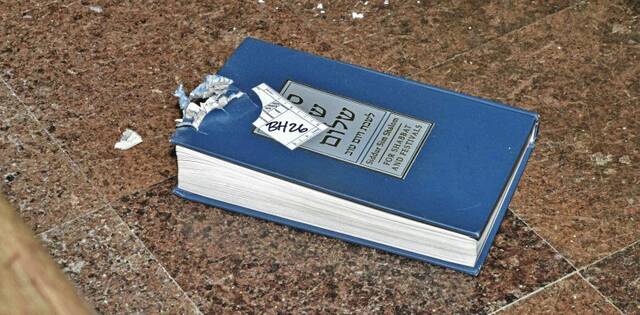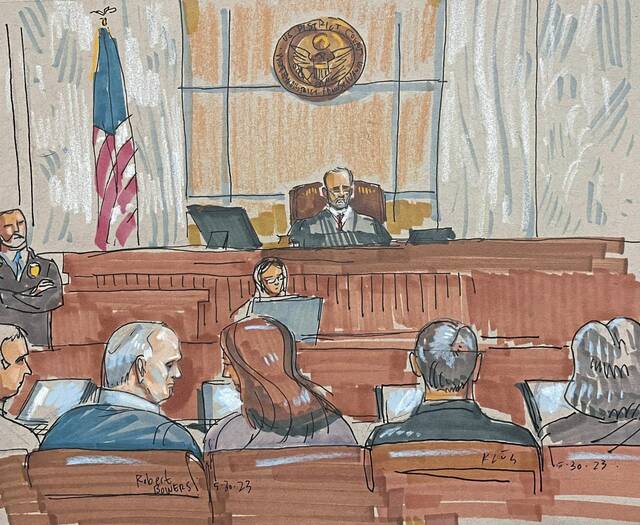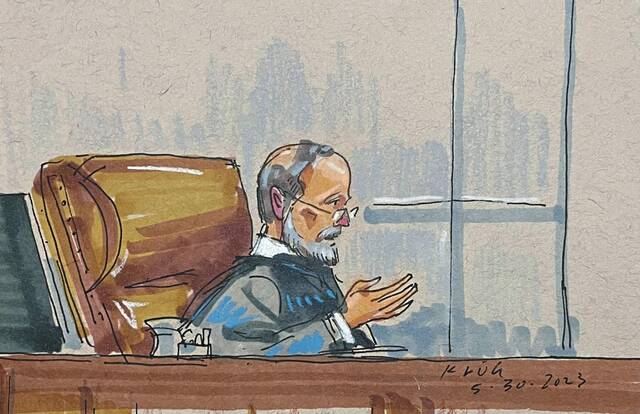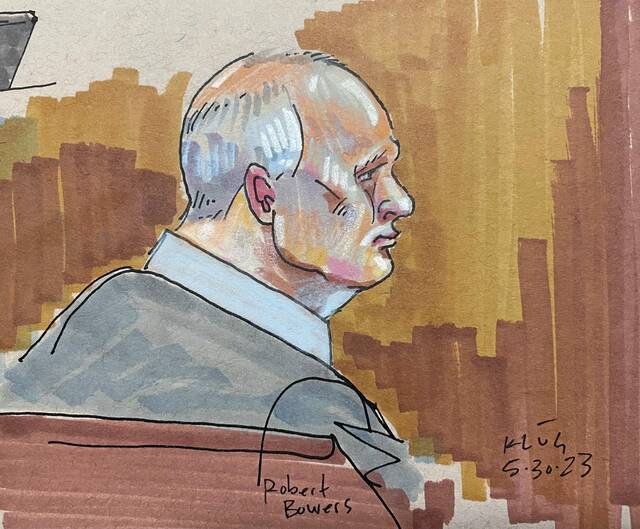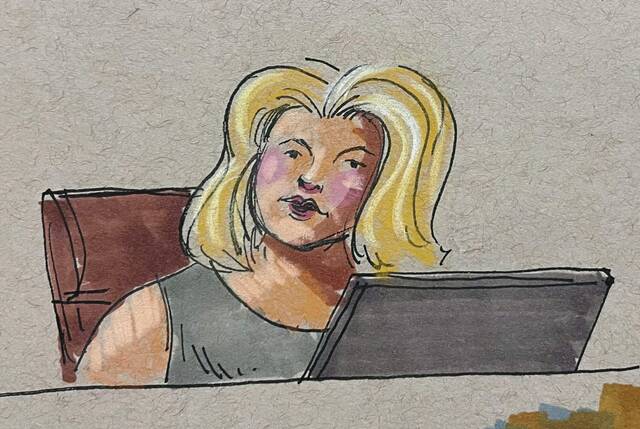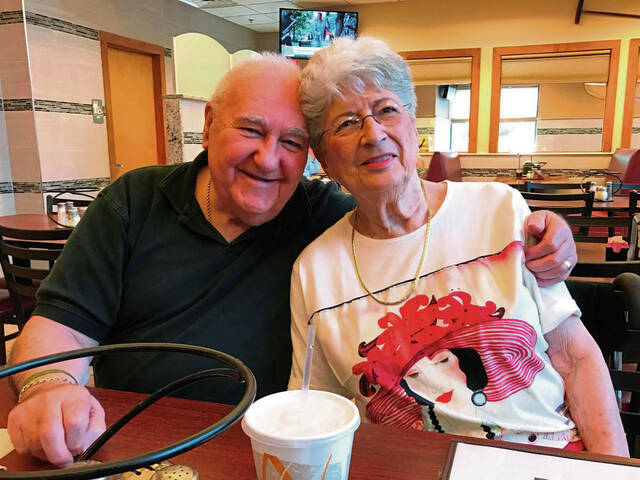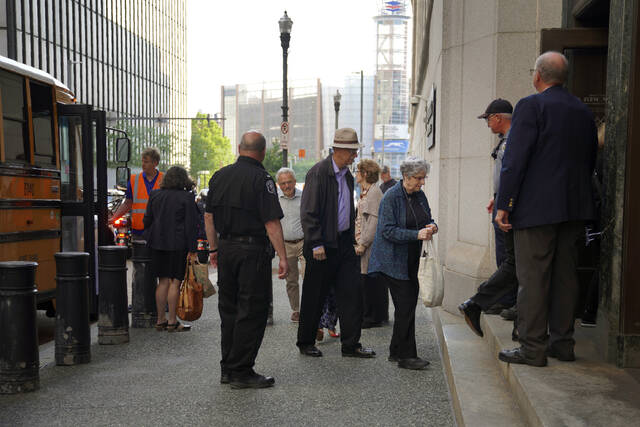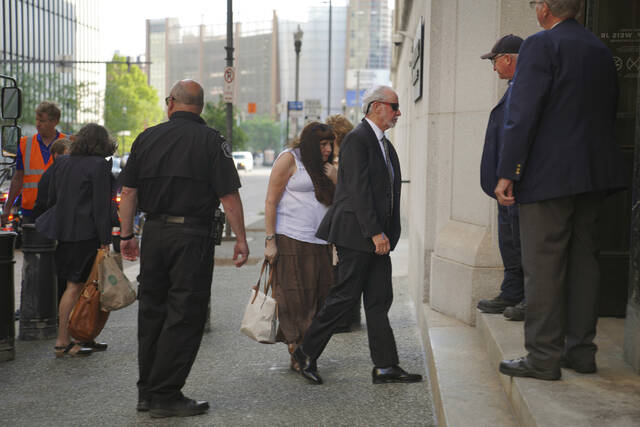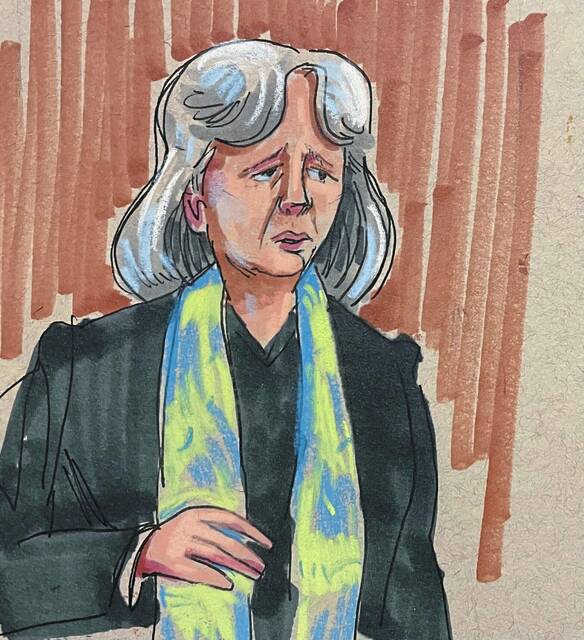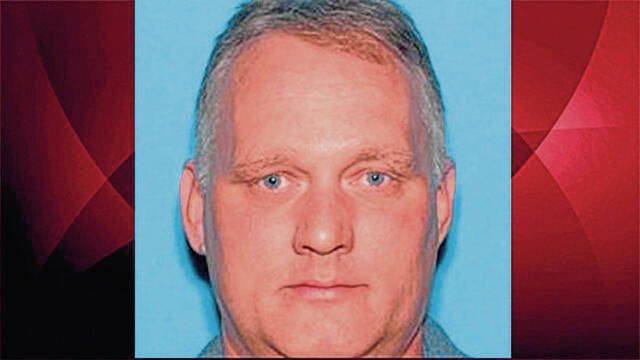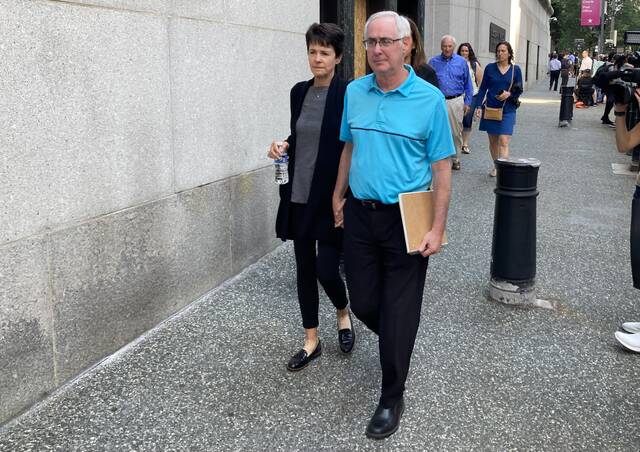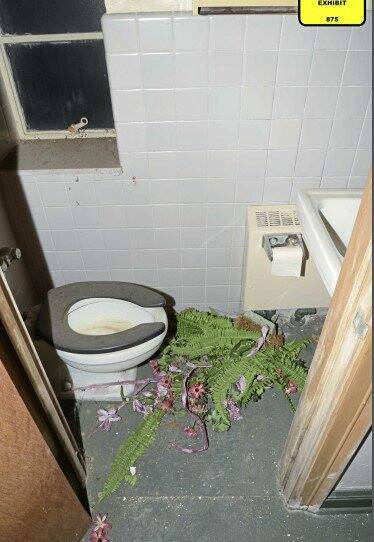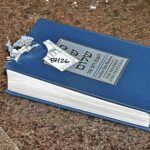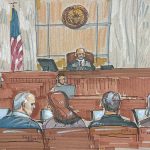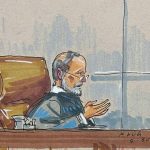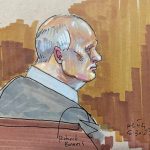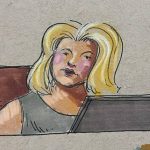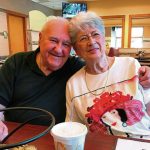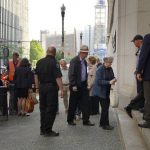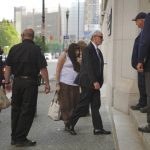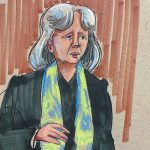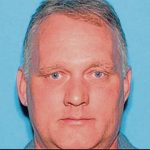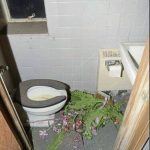For 40 minutes, Tree of Life Rabbi Jeffrey Myers gripped the doorknob in his right hand and held his cellphone to his ear with his left.
As the 911 calltaker sat silently on the other end of the line, waiting to hear more information about the active shooter in the Squirrel Hill synagogue the morning of Oct. 27, 2018, Myers whispered.
“I was praying,” he said Tuesday from the witness stand as the recording of his 911 call played. “I expected to die, and initially I was trying to decide — do I hang up the phone and call my wife? Do I make a video?”
But Myers did not want that to be the last thing his wife saw of him.
So he prayed.
“I thought about the history of my people, how we’ve been hunted and persecuted and slaughtered, and thought about the moments before their death,” he told the jury.
Myers recited a passage from the Torah and spoke the final confession.
“It wasn’t my God who did this,” he said. “I was prepared to meet my fate.”
But Myers, who had just joined the Tree of Life congregation as rabbi and cantor a year earlier, survived.
On Tuesday, he recounted what happened during the first day in the trial of Robert Bowers.
Bowers, 50, of Baldwin is charged with 63 counts in connection with the killing of 11 people during worship services at the synagogue.
Bernice Simon, 84, and her husband, Sylvan, 86, were among those killed at the synagogue, along with brothers David Rosenthal, 54, and Cecil Rosenthal, 59; Dan Stein, 71; Irving Younger, 69; Dr. Jerry Rabinowitz, 66; Joyce Fienberg, 75; Melvin Wax, 87; Richard Gottfried, 65; and Rose Mallinger, 97.
The government is seeking the death penalty.
Bowers’ trial began Tuesday before U.S. District Judge Robert Colville with opening statements from the government and defense, followed by emotional testimony from Myers and powerful recordings from the 911 dispatcher who answered the first call from the synagogue during the attack.
***
That morning, Bernice Simon sat next to her husband, Sylvan, in the synagogue’s Pervin Chapel — the same place they’d been married more than 60 years earlier.
Moments later, she held her prayer shawl against a gunshot wound in her husband’s back.
“There are shooters in here,” Bernice told Allegheny County 911 dispatcher Shannon Basa-Sabol. “The Tree of Life synagogue, we’re being attacked.”
The courtroom, filled to capacity, was silent as her calls with Bernice Simon were replayed.
Simon called 911 at 9:54 a.m. Before that call was cut off in less than a minute, she told Basa-Sabol that 20 to 25 people had been in the building for morning services.
“My husband’s bleeding,” Simon said, her voice rising. “My husband’s shot.”
“Oh, dear God. Dear, get up,” she told her husband.
Basa-Sabol, the first witness to testify in the trial, told Simon to stay on the ground.
As the call disconnected, the recording captured Bernice saying, “Syl.”
Basa-Sabol told the jury she immediately called Simon back on her cellphone. The dispatcher also told those working around her she could hear shots being fired during the initial call.
During the second call, Bernice Simon said she didn’t think her husband was breathing.
“Oh, God. Oh, my God. I can’t see anything. All I can see is blood on my husband,” she told the dispatcher. “Please hurry. I’m so scared.”
Basa-Sabol, who previously worked as an EMT, encouraged Simon to put pressure on her husband’s wound, but also to stay quiet and down on the floor.
Throughout the recording, loud sounds can be heard in the background.
“I’m scared to death. I think he might be dead,” Simon said. Moments later, more shots could be heard in the background.
“Be quiet,” Basa-Sabol said as people in the chapel could be heard screaming. “Don’t talk, Bernice. Don’t talk.”
And then, Bernice Simon said, “I just got …”
“Are you still with me?” Basa-Sabol asked.
She heard no response. Simon’s words were replaced by a sound like snoring, which Basa-Sabol reported in the dispatch system at 10:03 a.m. as being agonal breathing.
Basa-Sabol continued trying to get a response from Simon, at one point telling the woman to press a button on her phone if she was OK instead of trying to talk.
***
Assistant U.S. Attorney Soo Song began her opening statement detailing the 11 victims’ normal Saturday routines before worship. Some would prepare food for breakfast, while others readied the chapel.
“As they did every Saturday morning, men and women made their way to Tree of Life to worship, to practice their faith and to pray to God in the sanctity of their refuge,” Song said.
The prosecutor talked extensively about brothers Cecil and David Rosenthal, affectionately known to the congregants as “the boys,” who welcomed the congregants.
But Song also described the evidence that would be presented in an attempt to prove Bowers’ motivation.
She detailed Bowers’ antisemitic online history, saying he “seethed with hatred for Jewish people” and praised the Holocaust on social media. Shortly before the shooting, she said, Bowers wrote a post on the Gab social media site acknowledging his motivation to carry out the mass shooting.
Bowers posted that he believed the Hebrew Immigrant Aid Society, a Jewish refugee resettlement group also known as HIAS, was bringing in “invaders that kill our people. I can’t sit by and watch my people get slaughtered. Screw your optics, I’m going in.”
The government provided grim details, including information about victims being shot at close range and Bowers going room to room in the synagogue looking for victims across the three different congregations who worshipped there: Tree of Life-Or L’Simcha, Dor Hadash and New Light.
She said that when Bowers was caught by police, officers asked him why he carried out the shooting. Song said an officer reported that Bowers blurted out that “all Jews need to die” and “Jews are the children of Satan.”
“He left a trail of death and destruction in the synagogue,” Song said, leaving victims “in and under pews, clutching their prayer books, wearing their prayer shawls.
Song said there were 22 people in the synagogue when the shooting happened, and Bowers killed half of them.
The prosecutor noted that 11 survived through “terror, confusion and pain,” adding, “You will also hear testimony about their drive to survive.”
The case also will detail the congregants’ efforts to fiercely protect the Rosenthal brothers, and the responding police officers’ heroic acts to protect more from being wounded or killed.
“At its core, this case is also about survival,” Song said.
Several family members of the victims were in the courtroom gallery throughout the day. After Song concluded her opening, Pittsburgh police Officer Timothy Matson, who was shot in the attack, shared an extended hug with victim Rose Mallinger’s daughter, Andrea Wedner, who also was wounded.
In her 20-minute opening statement, defense attorney Judy Clarke did not mince words in describing Bowers’ actions.
“It’s incomprehensible. It’s inexcusable — the devastation, loss and grief we’re all about to hear, learn,” she said. “You’ll see it. You’ll feel it. You’ll agonize with every single witness that comes in to describe it.”
While defense attorneys will not deny Bowers was the attacker, Clarke said they would focus on his motive and intent.
The indictment against Bowers accuses him of committing a hate crime — specifically, killing the victims to prevent them from freely exercising their religion. Clarke said in her opening that the defense would focus its efforts questioning whether Bowers’ intent was rational.
Clarke questioned whether that was his motive. She read some of Bowers’ online posts about HIAS to the jurors.
“He was at the Tree of Life, plain and simply, to stop the support of HIAS,” Clarke said.
***
The day of the attack, Myers told the jury in often-emotional testimony, the service began at 9:45 a.m. His sermon was going to be about “the Jewish imperative to welcome all strangers no matter who they may be.”
But he never got to give it, as, minutes after the service started, Myers heard what he thought was, at first, a metal coat rack in the lobby being knocked over.
But when there was another sound. He recognized it was gunfire.
Myers instructed the congregants.
“I told them to either drop to the floor or lay flat on the pews to be quiet,” he said.
Myers testified he was hoping the attacker would not see them. He worried because most of his congregation was older, with limited mobility.
“I wasn’t confident they could run and get out of the room in sufficient time,” he said.
Myers then heard bursts of gunfire getting closer — the sound of bullets pinging off the marble floors in the lobby.
He fled through the bima — what would be considered an altar in a church — to the choir room above, dialing 911 as he did.
He made his way to a bathroom there — without a locking door, as he heard gunshots, yelling and screaming.
Rabbi Jeffrey Myers testified about his time holing up in upstairs, choir room bathroom while mass shooting was taking place at Tree of Life synagogue. Door wouldn't lock, so he held the handle while on a 911 call for 40+ minutes. More on his story here: https://t.co/XsEZNhYoNQ pic.twitter.com/0Q34YlQhXF
— Ryan Deto (@RyanDeto) May 31, 2023
As Myers spoke with 911, he gave his name and described what he was hearing — 20 to 30 shots had been fired at that point.
Periodically, in the call, bursts of gunfire could be heard: “Five shots were fired just now. There were another five just now. Another five now. Five more shots. Ten more shots just fired.”
The whole time, Myers gripped the bathroom doorknob.
“I thought, if I could sense someone turning the knob, I might have an element of surprise to pop open the door and fight,” he told the jury.
As the 911 call continued, Myers relayed that the person was still shooting.
It was then, during the call, that Myers thought he heard the suspect approaching on the stairs and began to pray.
But Bowers never found him.
Responding Pittsburgh police SWAT officers did.
“‘Right behind me,’” one of them instructed.
Four officers surrounded Myers’ body with theirs and raced him through the synagogue to safety.
He was shepherded past the chapel, where he had just been leading services.
He passed where the bodies of Bernice and Sylvan Simon and Rose Mallinger lay.
“I asked God to forgive me because I couldn’t save them,” he said.
Near the end of his testimony, Assistant U.S. Attorney Eric Olshan handed Myers a blue prayer book recovered from the floor of the chapel.
It had a bullet hole through it.
In Jewish tradition, the prayer book should never be on the floor, Myers said, and, if it is damaged, it is to be buried.
But, he told the jury, he kept that one.
“It’s a witness to the horror of the day,” he said. “One day when I’m not there, this book tells a story that needs to be told.”


